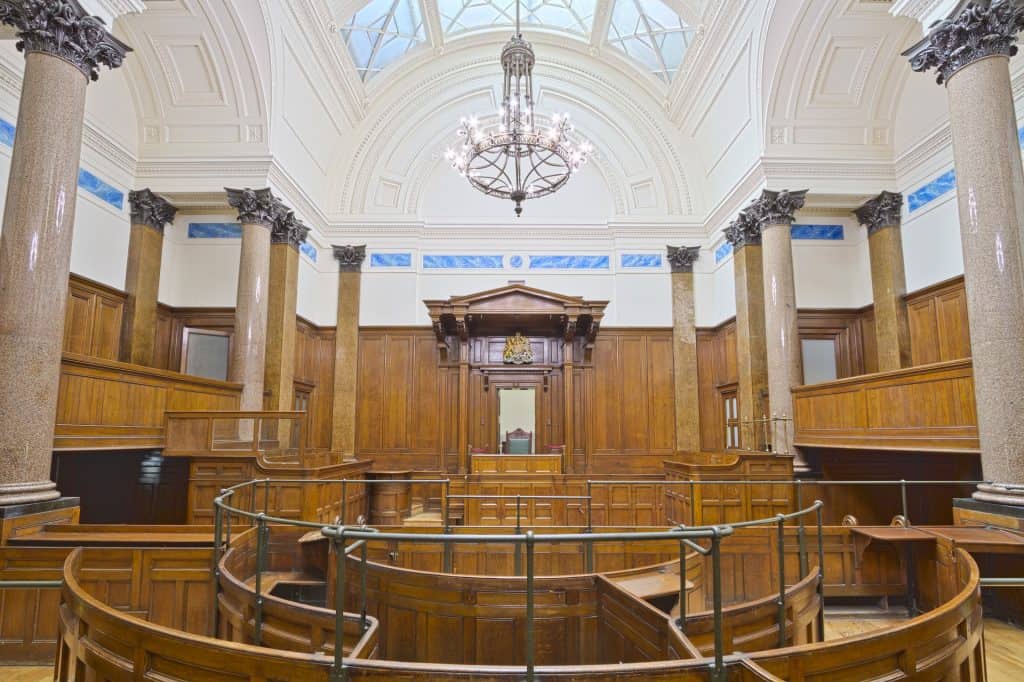Plea Deals: When and Why They Make Sense. When we imagine a criminal case, we think about a courtroom appearance and either a jury or judge reading the final verdict. But, 98% of criminal cases end in plea deals.
In any case in which a criminal defense lawyer does not believe it is possible to get the charges dismissed completely, or if getting the charges dismissed is impossible (such as strong evidence against the defendant) a plea deal will likely be discussed.
This discussion can be opened by either the prosecution or the defense and is a way to reach a resolution to the case faster, as well as giving the defendant a chance to have an element of “control” over the outcome of their criminal case.
What are the 3 Types of Plea Bargains?
There are 3 types of plea bargains, but only two are used commonly. These are:
- Fact Bargaining: This is the least common type of plea bargain. This is where the defense agrees to specific facts about the case in exchange for the prosecution leaving other facts out at the trial. This plea bargain does not avoid going to trial, so it is still based on guessing how the judge or jury will react to the information presented to them.
- Charge Bargaining: This is a common type of plea bargain where the defense agrees to a guilty verdict but by doing so has their charge reduced, and so receives a lesser punishment.
- Sentence Bargaining: This is similar to charge bargaining, but instead of having the charge reduced it involves pleading guilty in return for a reduced sentence.
Why are So Many Cases Plea Bargained?
The main reason why so many cases are settled via a plea bargain is because it saves time and money on going to trial. A criminal trial can take months, or even years, if the case is complex enough. For all that time there are legal fees to pay, both the accused, the alleged victim(s), and their families have to live in a state of limbo, and that may mean the alleged offender is sitting in a jail cell.
Besides the reasons why it’s (often) to everyone’s benefit to have a speedy case, another reason to negotiate a plea deal is just that – you can negotiate. This gives both sides an opportunity to control the outcome and come to an agreement both sides are satisfied with. When a case goes to trial everything is unknown, so a plea deal has the benefit of knowing exactly what you’re agreeing to and what the outcome will be.
What’s the Downside of a Plea Bargain?
Some of the downsides to plea bargaining is:
- Both sides lose their right to a trial by jury
- It will create a criminal record
- A judge can void the agreement and impose a different sentence (or no sentence at all)
- There is no chance of an appeal
- The outcome can be seen as unfair
Why Would a Prosecutor Offer a Plea Bargain?
Volume of Cases
One of the primary reasons why prosecutors offer plea bargains is because both they and the judge have very little time and a lot of cases to try. Judges will often put pressure on prosecutors to move the cases through more quickly, and so prosecutors look to plea bargains as a way to remove cases from the calendar that can reach a solution without going to trial.
Assures a Conviction
Perhaps the most common reason why a prosecutor would offer a plea bargain is to assure a conviction. All plea bargains should – in almost all cases – end in a conviction. While that conviction may be a lesser one that may be served if the case went to trial, it is a conviction nonetheless, and there is always the risk of a not guilty verdict if a conviction is not agreed to in a plea bargain.
Protect Informants and Victims
If the arrest was the result of an informant, they will try to reach a plea deal so no informant or witness has to testify at a trial, or reveal that informant’s criminal history at trial. If an informant has a criminal history they may be impeached at the trial, and the prosecution wants to avoid that so that informant can continue to help them stop criminal activity.
Going to trial can be particularly stressful for alleged victims and witnesses, so a plea deal will allow the prosecution from putting additional stress and pressure on alleged victims. While, in many cases, alleged victims want to see the alleged perpetrator get the maximum punishment for their crime, some prefer to balance a desire to move on with the knowledge that the perpetrator will be found guilty.
The Plea Bargaining Process
Plea bargaining typically begins after charges are filed and before the case goes to trial. Either the prosecution or the defense may initiate discussions to negotiate a resolution without a trial. The process generally involves the following steps:
- The prosecution reviews the evidence and determines whether a plea deal is appropriate.
- The defense evaluates the strength of the case and discusses potential options with the defendant.
- Negotiations take place, with both sides proposing terms for a plea agreement.
- If an agreement is reached, the defendant formally enters a plea in court.
- The judge reviews the agreement and decides whether to accept or reject it.
If the judge approves the plea deal, the defendant waives their right to a trial and accepts the agreed-upon terms. If rejected, negotiations may continue, or the case may proceed to trial.
Factors Influencing a Plea Bargain
Several factors influence whether a plea bargain is offered and accepted. These include:
- The strength of the prosecution’s evidence—stronger cases lead to less favorable plea offers.
- The severity of the charges—minor offenses are more likely to result in plea deals.
- The defendant’s prior criminal record—first-time offenders often receive better plea options.
- Court backlog—prosecutors may offer plea deals to reduce caseloads and avoid lengthy trials.
- Public or political pressure—high-profile cases may have fewer plea bargaining opportunities.
These factors help determine whether a plea bargain is a viable option and what terms might be negotiated.
How Plea Bargains Work in Different Criminal Cases
Plea bargains are used in a wide range of criminal cases. The type of plea deal offered often depends on the severity of the charges, the strength of the evidence, and the goals of the prosecution and defense. Below are examples of how plea bargaining might play out in different types of cases:
1. DWI/DUI Charge – Sentence Bargaining
A first-time DWI/DUI offender in Missouri faces penalties such as license suspension, fines, and potential jail time. If the prosecutor has strong evidence—such as a failed breathalyzer test and dashcam footage—the defense attorney may negotiate a sentence bargain.
- The defendant agrees to plead guilty to DWI/DUI in exchange for a reduced sentence, such as probation instead of jail time and the ability to keep their driving privileges with an ignition interlock device.
- This benefits the court by avoiding a trial while allowing the defendant to maintain employment and avoid harsher penalties.
Pleading Down to a Lesser Traffic Violation
In some cases, particularly for first-time offenders or if there are weaknesses in the prosecution’s case, a defense attorney may negotiate the DWI/DUI charge down to a lesser traffic violation, which carries lower fines and penalties than a full DWI/DUI conviction. Pleading down to a lesser offense can help avoid a criminal record, reduce fines and insurance increases, and prevent license suspension.
2. Drug Possession – Charge Bargaining
A person is arrested with a small amount of a controlled substance, which could result in a felony drug possession charge. Missouri has strict drug laws, but a plea deal may be possible.
- The defense negotiates a charge reduction, agreeing to a guilty plea for a lesser offense, such as possession of drug paraphernalia.
- The defendant avoids a felony record, which could affect employment and housing opportunities.
- In some cases, the plea bargain may also involve drug counseling or rehabilitation as an alternative to jail time.
3. Assault and Battery – Fact Bargaining
A defendant is charged with aggravated assault after a bar fight left another person with injuries. The prosecution has witness statements and security footage supporting the charge.
- The defense negotiates a fact bargain, agreeing to stipulate that the defendant threw the first punch while excluding witness statements that could make it appear premeditated.
- This could result in a less severe charge or impact sentencing recommendations at trial.
- While the case may still go to trial, limiting certain facts can improve the defendant’s chances of a better outcome.
4. White-Collar Crime – Charge Bargaining
A business executive is charged with embezzlement and wire fraud, facing up to 20 years in prison if convicted. The prosecution has a paper trail of evidence, but the defense argues that the defendant did not act with criminal intent.
- A charge bargain is negotiated where the defendant pleads guilty to misappropriation of funds, which carries a much lower sentence than wire fraud.
- In exchange for avoiding trial, the defendant agrees to pay restitution and serve a reduced prison term or home confinement.
- This ensures financial restitution for victims while minimizing court resources.
5. Domestic Assault – Sentence Bargaining
A defendant is charged with domestic assault after an altercation with a partner. The prosecution has police bodycam footage showing injuries on the alleged victim, but no independent witnesses to the incident.
- The defense negotiates a sentence bargain where the defendant pleads guilty to domestic assault in exchange for a reduced sentence, such as probation instead of jail time.
- The agreement may also include court-ordered anger management classes or community service rather than incarceration.
- This allows the defendant to avoid a harsher penalty while still accepting responsibility, and it benefits the court system by avoiding a lengthy trial.
Sentence bargaining is commonly used in domestic violence cases to reach a resolution while balancing rehabilitation with legal consequences.
Should I Take a Plea Bargain?
Whether or not you should take a plea bargain depends on your case and the advice you receive from your defense council. This is why it’s important to have a criminal defense lawyer who will fight for your freedom, and not simply use a defender who has been assigned to you by the state. While public defenders will endeavor to do their best, they are often overworked and have the same interests as the prosecution and judges in wanting to settle cases as fast as possible.
In order to have a truly strong defense, you need to hire a criminal defense lawyer who will advise you and negotiate the very best circumstances for you, not just the circumstances that will get the case off their plate as soon as possible.
If you’ve recently been charged with a crime in the St. Louis Metro area, we’re here to help. Simply contact us online or call (314) 900-HELP your free consultation and we’ll get back to you as soon as possible to discuss your case.







